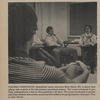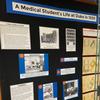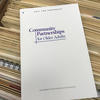Duke Medical Center Archive Blog

Your Story Matters! Reflection Prompts
Posted On: September 17, 2020 by Rebecca Williams
For the past several months, the Duke University Archives and the Duke University Medical Center Archives have been collecting stories from students, faculty, and staff about their experiences during this unique time in history.
You may have seen articles about our efforts in The Chronicle or Duke Today. If you are anything like me, there is a good chance that you read about our collection efforts, but didn’t respond because you felt like you did not have anything to share. Or maybe you have too many experiences to share and it all just feels a little overwhelming! We want to… MORE
Category: News

Remembering Dr. Catherine Wilfert
Posted On: September 15, 2020 by Rebecca Williams
The Duke Community was saddened to learn of the passing of Dr. Catherine Wilfert this past weekend. She leaves behind an extraordinary legacy of scholarship, patient care, advocacy, and mentorship. Dr. Wilfert was born on 26 July 1936, in Inglewood, California. She graduated with distinction from Stanford College in 1958 and then attended Harvard Medical School. Her internship was at Boston City Hospital, and her residency was at North Carolina Baptist Hospital. In 1964, Wilfert returned to Boston, where she continued to work in pediatrics and medicine. In 1971, she came to Duke University School of Medicine, where she achieved the rank of division chief of Pediatric Infectious… MORE
Category: News, Collection Spotlight

Remembering Dr. Catherine Wilfert
Posted On: September 15, 2020 by Rebecca Williams
The Duke Community was saddened to learn of the passing of Dr. Catherine Wilfert this past weekend. She leaves behind an extraordinary legacy of scholarship, patient care, advocacy, and mentorship. Dr. Wilfert was born on 26 July 1936, in Inglewood, California. She graduated with distinction from Stanford College in 1958 and then attended Harvard Medical School. Her internship was at Boston City Hospital, and her residency was at North Carolina Baptist Hospital. In 1964, Wilfert returned to Boston, where she continued to work in pediatrics and medicine. In 1971, she came to Duke University School of Medicine, where she achieved the rank of division chief of Pediatric Infectious… MORE
Category: News, Collection Spotlight

Remembering Dr. Thomas Roberts Kinney
Posted On: May 27, 2020 by Rebecca Williams
We were saddened to learn of the passing of Dr. Thomas Roberts Kinney earlier this week. Dr. Kinney was the Wilburt C. Davison Distinguished Professor of Pediatrics and Associate Chair Emeritus in the Department of Pediatrics. Dr. Kinney had a long career here at Duke. You can see him pictured in the 1970 Intern composite from the July 1970 issue of the Intercom.
Dr. Kinney is widely known for his work as both a clinical researcher and… MORE
Category: Collection Spotlight, News

Remembering Dr. Thomas Roberts Kinney
Posted On: May 27, 2020 by Rebecca Williams
We were saddened to learn of the passing of Dr. Thomas Roberts Kinney earlier this week. Dr. Kinney was the Wilburt C. Davison Distinguished Professor of Pediatrics and Associate Chair Emeritus in the Department of Pediatrics. Dr. Kinney had a long career here at Duke. You can see him pictured in the 1970 Intern composite from the July 1970 issue of the Intercom.
Dr. Kinney is widely known for his work as both a clinical researcher and… MORE
Category: Collection Spotlight, News

Library Zoom Backgrounds
Posted On: May 21, 2020 by Rebecca Williams
Do you miss meeting and studying in the Medical Center Library? We sure do! Instead we are all spending a lot of time on Zoom these days. Changing your background is a great feature to hide your messy house, block that roommate in profile in the background, or just to express your own creativity and personality. We have created several free background templates for you to download and use. They feature images from the Medical Center Library and surrounding campus from the very beginning of the hospital until now. You can click on any of the images below to enlarge and save to your computer or you can download them directly from this Box folder. … MORE
Category: News

Your Story Matters! Documenting COVID-19 at Duke
Posted On: May 11, 2020 by Rebecca Williams
COVID-19 has changed and disrupted our lives, at Duke and around the world. On campus, most students have returned home, classes are online, and all events are cancelled. Many staff are working from home; others that are deemed essential continue to work on campus. The hospital is preparing for an influx of people infected with COVID-19. Duke researchers are trying to find ways to fight the disease, from identifying treatments to creating better protective equipment.
And we all live with the fear of the physical impact of the virus, both for ourselves and our families.
The Duke University Archives and the Duke University Medical Center Archives have been hard at work to document this unique time in history. We have been capturing all of the news alerts, email… MORE
Category: News

Tales from the Archives: “It’s not just wedding bells and diaper pails”
Posted On: April 27, 2020 by Rebecca Williams
Balancing the responsibilities of parenthood and those of a medical career is challenging, and this was certainly also the case for those at Duke in the 1970s. During the twentieth century American conceptions and ideals parenthood shifted drastically as a response to medical advances, social movements, and more and more attending college and/or working outside the home. Tucked away in old issues of the Intercom, Duke Medicine’s primary news publication from 1953 to 1986, we can find clear evidence that Duke faculty and students were grappling with these shifting perceptions, expectation, and values surrounding parenthood throughout the 1970s.
Beginning in 1972, Professor Betty Harris, an… MORE
Category: Collection Highlights

Eleanor B. Easley Papers Addition
Posted On: April 14, 2020 by Rebecca Williams
The Duke University Medical Center Archives is happy to announce the recent addition to the Eleanor B. Easley Papers is processed and open for research. The addition includes Easley’s degrees, memberships, North Carolina medical license, and awards from her medical career. Materials date from 1928 to 2000.
The Easley Papers contains the professional papers of Eleanor Beamer Easley (1907-1998), a doctor of obstetrics and gynecology who practiced in Durham, North Carolina. Easley was the first female graduate of Duke's School of Medicine's first four-year class. In 1941, Easley helped co-found the… MORE
Category: News, Collection Spotlight

Eleanor B. Easley Papers Addition
Posted On: April 14, 2020 by Rebecca Williams
The Duke University Medical Center Archives is happy to announce the recent addition to the Eleanor B. Easley Papers is processed and open for research. The addition includes Easley’s degrees, memberships, North Carolina medical license, and awards from her medical career. Materials date from 1928 to 2000.
The Easley Papers contains the professional papers of Eleanor Beamer Easley (1907-1998), a doctor of obstetrics and gynecology who practiced in Durham, North Carolina. Easley was the first female graduate of Duke's School of Medicine's first four-year class. In 1941, Easley helped co-found the… MORE
Category: News, Collection Spotlight

Remembering MaryAnn E. Black
Posted On: March 27, 2020 by Rebecca Williams
The Duke Community was saddened to learn of the passing of MaryAnn E. Black yesterday. She leaves behind an extraordinary legacy of leadership and service to the Durham and Duke communities. Across her various positions as social worker, Durham County Commissioner, and State Representative, MaryAnn Black continuously sought to promote the health and human service needs of all Durham residents. Upon hearing the news of her passing, we returned to an oral history interview conducted with Ms. Black to hear her insights. Her remarkable dedication to public service and gifts of cultivating partnerships is apparent throughout the interview. When talking about breaking down barriers in healthcare, she noted the importance of diverse hiring practices and avenues for progress: “Breaking those… MORE
Category: News, Collection Spotlight

Remembering MaryAnn E. Black
Posted On: March 27, 2020 by Rebecca Williams
The Duke Community was saddened to learn of the passing of MaryAnn E. Black yesterday. She leaves behind an extraordinary legacy of leadership and service to the Durham and Duke communities. Across her various positions as social worker, Durham County Commissioner, and State Representative, MaryAnn Black continuously sought to promote the health and human service needs of all Durham residents. Upon hearing the news of her passing, we returned to an oral history interview conducted with Ms. Black to hear her insights. Her remarkable dedication to public service and gifts of cultivating partnerships is apparent throughout the interview. When talking about breaking down barriers in healthcare, she noted the importance of diverse hiring practices and avenues for progress: “Breaking those… MORE
Category: News, Collection Spotlight

Digital Research Resources
Posted On: March 25, 2020 by Rebecca Williams
As of Friday, March 13, 2020 at 5pm, the Duke University Medical Center Archives is closed to the public until further notice due to COVID-19. Staff are working remotely and are available for consultation via our online request form or via email. We cannot access our physical collections, but we are happy to answer general questions and assist you in locating digital materials for your research if possible.
Below are some available online resources:
MEDSpace – If you’re looking for historic images, our digital repository, MEDSpace, is an excellent place to start. MEDSpace contains nearly 700 photographs documenting the history of Duke Medicine. You can also find early publications, medical illustrations and artwork, and medical… MORE
Category: News

New Exhibit Features Med Student Life in 1930
Posted On: March 9, 2020 by Rebecca Williams
We are excited to announce the installation of a new exhibit on Level 3 of the Medical Center Library. “A Medical Student’s Life at Duke in 1930” explores the lives of Duke’s first medical students, 52 first-year and 18 third-year medical students who were admitted to the new medical school in the fall of 1930. According to the 1930-1931 School of Medicine Bulletin, the estimated yearly cost of attendance for students was between $295 and $315. Each year the school offered four terms of eleven weeks, commencing October 1st with one-week vacations in December, March, and June and a one-month vacation in September. Students were required to complete three terms… MORE
Category: News

George L. Maddox Papers
Posted On: February 17, 2020 by Rebecca Williams
The Medical Center Archives is happy to announce that new additions to the George L. Maddox Papers are open for research. This collection contains the personal and professional papers of George L. Maddox, a former director of the Duke University Center for the Study of Aging and Human Development.
Over the course of his career, Maddox was a major figure in the push to improve health care and the quality of life for older adults in the United States. While at Duke, he was not only the director of the Center for the Study of Aging and Human Development, but also the program director for the Center’s Long Term Care Resources Program (LTRCP). This program was focused on providing… MORE
Category: News, Collection Spotlight
